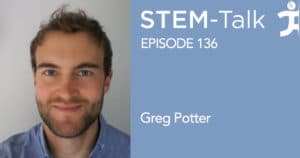Greg Potter STEM-Talk tracks power of body’s “master clock”
Published 5.17.22
Your body’s “master clock” evolved to help keep you alive and safe. And when it’s disrupted, it doesn’t take long at all for the negative impacts of that circadian rhythm shift to be felt in your health and well-being.
The latest episode of STEM-Talk (episode 136) brings a deep-dive into the intricate connections between your body’s circadian biology, sleep, diet, and metabolism, with Dr. Greg Potter.

Dr. Greg Potter is the guest on Episode 136 of STEM-Talk.
Potter gained attention in the U.S. and Europe for his research into the importance of biological rhythms and sleep and how they affect people’s lives. His work has been featured in the BBC World Service, the Washington Post, Reuters and other scientific journals and news outlets.
He also co-founded Resilient Nutrition in 2020, a company that leverages science to produce foods and supplements geared toward helping people feel and perform better. He earned undergraduate and master’s degrees in exercise science from Loughborough University in England before heading off to the University of Leeds for his Ph.D.
During his STEM-Talk interview, Potter talks about a paper he published in Endocrine Reviews in 2016 on circadian rhythm and sleep disruption. Some of his key points:
Organisms evolve in the presence of relatively predictable changes in the environment: light, temperature, food availability. Think of these as an environmental clock, he says. To thrive in these environments, people evolved biological rhythms to cope:
- Ultradian rhythms repeat cyclically throughout a 24-hour period (heartbeat, blinking, appetite, circulation, etc.).
- Circadian rhythms recur every 20-30 hours (core body temperature, sleep-wake cycle). These persist even when someone doesn’t have time cues.
- Infradian rhythms, the slowest of these, last longer than one day, such as the menstrual cycle.
The purpose of these rhythms is to maximize our body’s performance of certain functions and adapt to changes in the environment, Potter said. Think of it as a master clock in your brain (circadian clock) and peripheral clocks.
“Why is it a problem if we disrupt our clock? Most if not all aspects of our biology suffer and many of us have felt this during jetlag,” he says.
Some experiments have shown that if you assign otherwise healthy people to a 28-hour day, after three of those days, they begin to show signs of pre-diabetes because their eat-sleep cycle is so disrupted, Potter said. This misalignment increases blood pressure and increases inflammatory markers.
Blood sugar regulation is one of these peripheral clocks. Studies show people’s glucose tolerance is 17 percent lower in the biological evening than it is the biological morning. Metanalysis has shown that blood sugar responses therefore are worse when you eat between 8 p.m. and 4 a.m.
Humans now face dealing with the “social clock”, which our evolutionary ancestors did not have, but that industrialization made this clock more prominent.
For example, Potter said, we now spend 88 percent of our days indoors. Indoor lighting is lower intensity that natural light – 30 times less intense than natural sunlight.
“We’ve also engineered physical activity out of our lives,” Potter says. We don’t have to be active to get our food. Some 86 percent of American don’t meet basic physical activity requirements, Potter says. Now in the digital age, we can work in distributed teams across multiple time zones and that can contribute to disruption.
All of that combines for a lot of change – and evolutionarily speaking — our bodies haven’t caught up to all those changes.
“Our body’s clock still follows the sun despite whatever the social clock does, despite whatever time changes are enforce,” Potter said.
Listen to the whole talk here, and look for part two to cover topics ranging from insomnia, sleep apnea, time-restricted eating, exercise, and nutrition.
Latest News
- STEM-Talk: Pascal Lee on returning to the Moon — and heading to Mars
- Aging Symposium draws experts to IHMC
- IHMC hosts Fredric G. Levin Lung Care Symposium March 27-28 in Pensacola
- Humanoid robotics and exoskeletons lead latest IHMC newsletter
- Celebrate Robotics Week at IHMC Open House on April 11, 2025
- Registration open for 2025 Summer Robotics Camp
- STEM-Talk: JP Errico on vagus-nerve stimulation, inflammation and chronic disease management
- STEM-Talk: Karl Herrup on shortcomings of Alzheimer’s research
- Pensacola attorney joins IHMC Board of Directors

